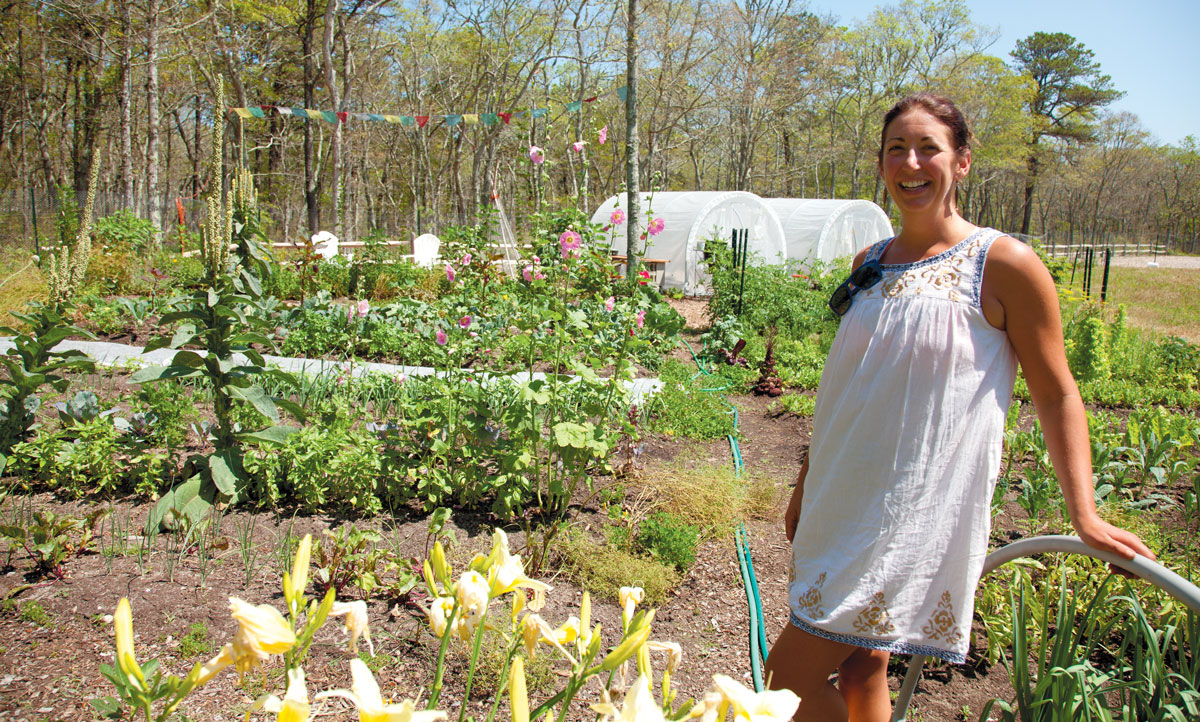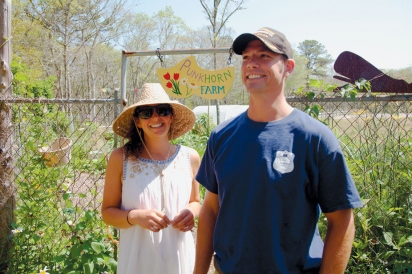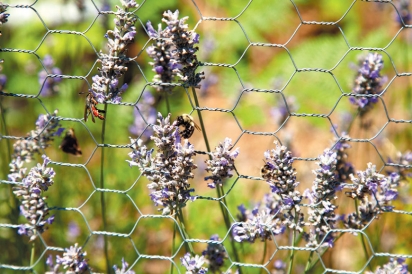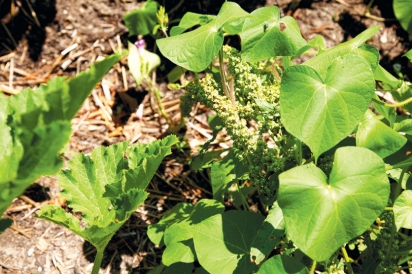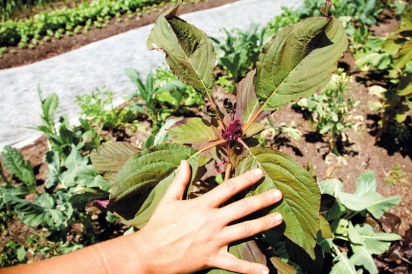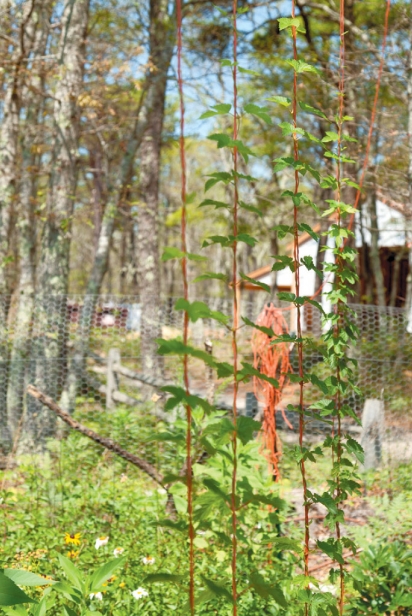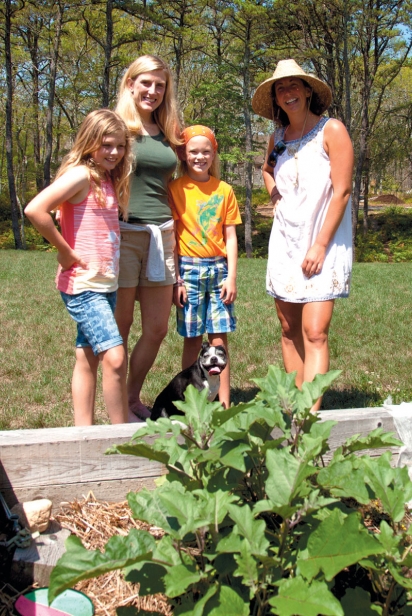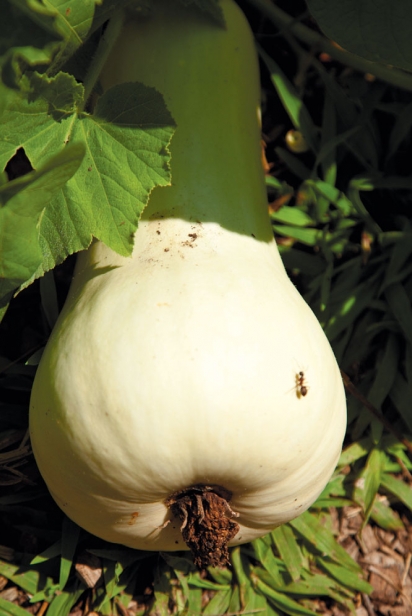Playing with Permaculture on Punkhorn Farm
Time seems to stand still in the Punkhorn Parklands of Brewster. Rural roads wind between kettle ponds and bogs, which segue to trails through 835 acres of oak and pine. A hiker or horseback rider might appear before becoming shrouded in the swampy depths. Birds call, uninterrupted by the white noise of traffic. At the end of a cartway, curious wanderers will stumble upon Punkhorn Farm, a permaculture garden that combines ancient rhythms with contemporary thinking on what it means to grow food.
What began as a place for the deRuyter family to raise their kids in the late eighties has morphed into a three-family compound for those kids, in turn, to start their own families. Three acres are now fifteen, and the trees have been thinned to allow children to run in the grass, apple trees to blossom, and for the youngest deRuyter, Dani, to practice the art of permaculture.
“The idea of having a farm is about getting back to family, community, and in a sense shrinking the degree of separation of where our food comes from,” Dani told me when I came to visit on a sweltering July morning. Winter moths fluttered peacefully among the pines, beautiful yet devastating in their numbers, while myriad beneficial insects created an ecosystem all their own amongst the edible perennials, medicinal weeds, and heirloom annuals.
Like all good ideas, the plan to start a farm was seeded with a dream that Dani and her brothers, Nick and Ben, cultivated while sowing their wild oats near and far. As the brothers settled down on the Punkhorn property, Dani gained a certificate in permaculture design from Occidental Arts and Ecology in Sonoma County, California. With years as a farm manager and garden designer under her belt, she returned to her Brewster roots a few years ago, ready for the dream to germinate into reality.
“To put it simply, Ben handles the business, Dani is the farmer, and I fix everything,” says Nick with a smile. A former Marine who runs a landscape company, Nick started clearing trees on the property about six years ago, returning the mulch to the land and letting light filter onto what would become Dani’s gardens.om.”
Cape Cod’s soil—especially in the Punkhorn Parklands—is not the stuff that fertile farms are made of. The deRuyters are taking it slowly, building up the soil with green compost (cover crops of buckwheat, clover, and vetch), lobster compost, oyster shells, and Nick’s special mixture of tree mulch and spent grains from the nearby Devil’s Purse Brewing Company.
“The fermented grains make all those wood chips turn into black gold faster than anything,” says Nick. In time, the brother and sister duo plan to grow hops and brew beer as well, but in the meantime they supply specialty ingredients like thimbleberries and Japanese mint to Devil’s Purse.
While also selling produce to Clean Slate in Dennis and the 1620 Brewhouse in Provincetown (owned by their brother Ben), the deRuyters are building a barn for a certified kitchen where Dani plans to concoct herbal tinctures, jams, and spreads for sale. This winter, she and Nick plan to brew their own beer from the hops that—for now—provide pleasant shade in the garden.
“This is as much a family endeavor as it is a commercial enterprise,” Nick says. “We want to create a sustainable space for our kids to grow up on, and have fun doing it. Making compost is so much cooler than just shopping locally.”
Amending the soil is an ongoing process, but after several years of clearing and composting, Dani has a couple acres of productive garden space and hoophouses. She and Nick are working out the irrigation, planning an apple orchard, and figuring out how to “scale up” their chicken flock to be able to sell eggs. But they’re not in a rush.
“Just like nature, you can’t shock the system and expect things to survive. It’s the same with having a farm, you have a higher potential of success if things just naturally progress,” Dani says.
While testing and plotting her gardens with Post-Its and spreadsheets, Dani is becoming reacquainted with the native plants of Cape Cod. What looks like useless weed to many of us is a sacred medicine to her. Lifting a melon leaf to reveal a seed-laden plant called “curly dock”, Dani notes that its iron-rich root is also a powerful liver-cleanser. She purposely grows plantain (not to be confused with the Caribbean starch), which has leaves that help with indigestion, heartburn and ulcers if taken as a tea or tincture, or a remedy for cuts and insect bites if used as a salve.
“I’ve always resonated towards natural medicinal remedies, and I’m constantly curious and learning more,” Dani says, as nearby a line of Tibetan flags waves over a tunnel of hops. “That’s what I love about farming, I will never know everything. It’s a practice, just like yoga, reminding me to be patient, observant, loving, respectful, and grateful.”
With this fresh perspective, gardeners that have been trained to pull out anything out of order—or worse, spray with pesticides—might pause. The whole idea behind polycultural systems is to cultivate the wild, finding combinations of crops and relationships that will maximize synergy between plants. In a polycultural garden, the goal is not just to create as much consumable produce as possible—that is just the benefit of a healthy garden ecosystem, where the bugs, the soil microbes, and the plants work together in harmony.
“Edible food forests and mimicking the natural systems that already exist in nature is my passion,” Dani says. “I’m the referee: I’ll say what plays, or doesn’t.”
Though the pests and climate differ between coasts, Dani says the principles of permaculture are the same anywhere. “It’s the greatest reward for the least amount of effort—but you are giving, not just taking,” she says. As an example, she points out that growing perennial edibles (such as sunchokes and blueberries) mean that she spends less effort tilling the soil each year, allowing microbes to establish healthy soil that leads to better crops. The hollyhocks, morning glories, and zinnias in her garden aren’t just pretty to look at: they attract bees and butterflies that pollinate and diversify the squash and tomatoes.
Seed saving is another principle of permaculture, and part of the experimentation that fills Dani’s notebooks each season. She’s got lima beans from Hawaii, blue corn from California, and an heirloom painted bean from Vermont—where her own seeds are growing as well. “There’s strength in diversity,” Dani says. “Our mentality is the opposite of monocropping. We grow whatever is successful and we enjoy eating.”
Enjoyment is, at the end of the day, what food is all about. Dani’s approach to farming is no different. “Farming is an act of giving: to myself, to the land, and to my family and community,” she says. “It’s a dream to create a welcoming space for people to experience, enjoy, and learn about land stewardship. I want my community to be involved, so that they can know their farmer and where their food comes fr


